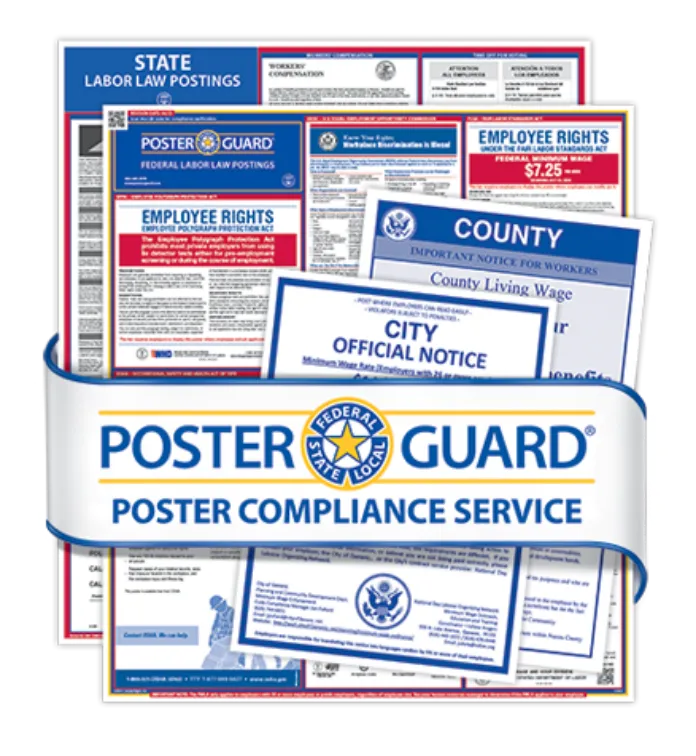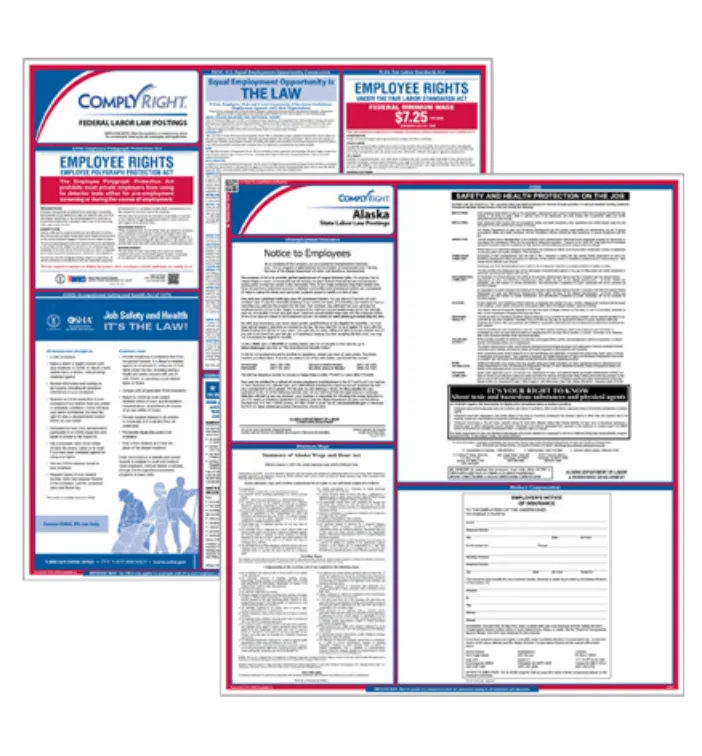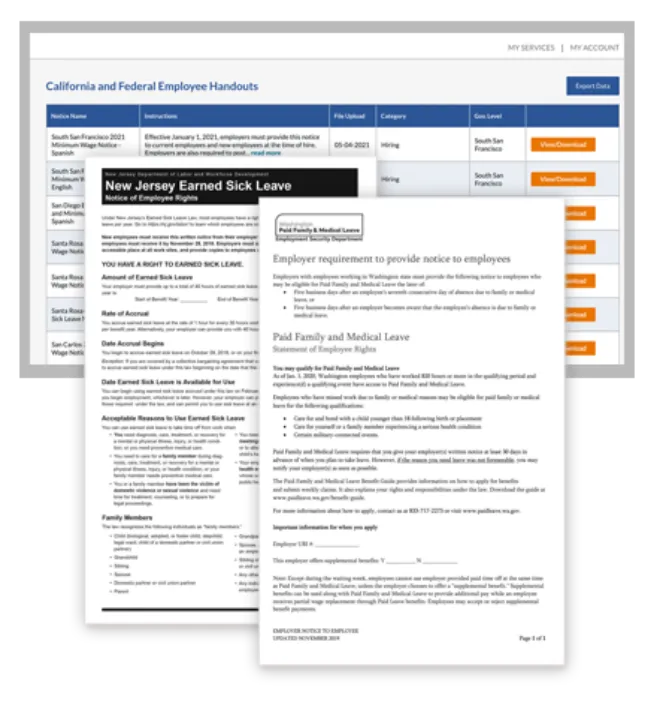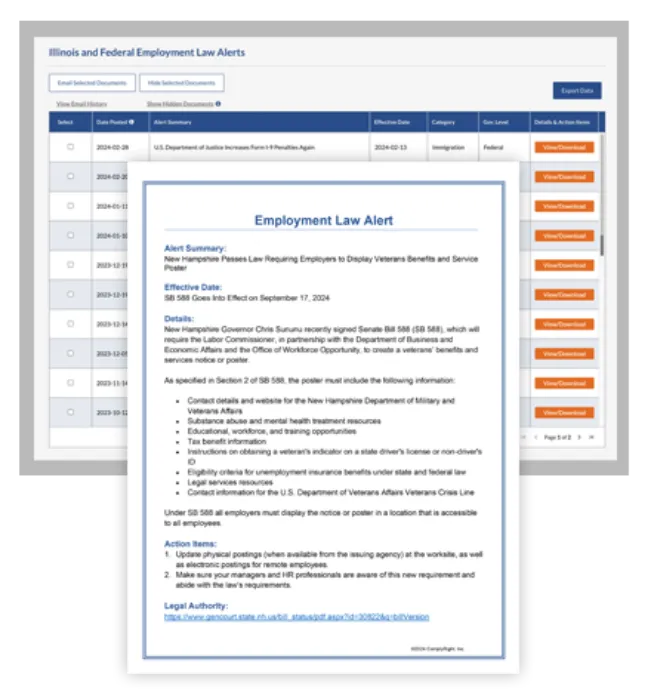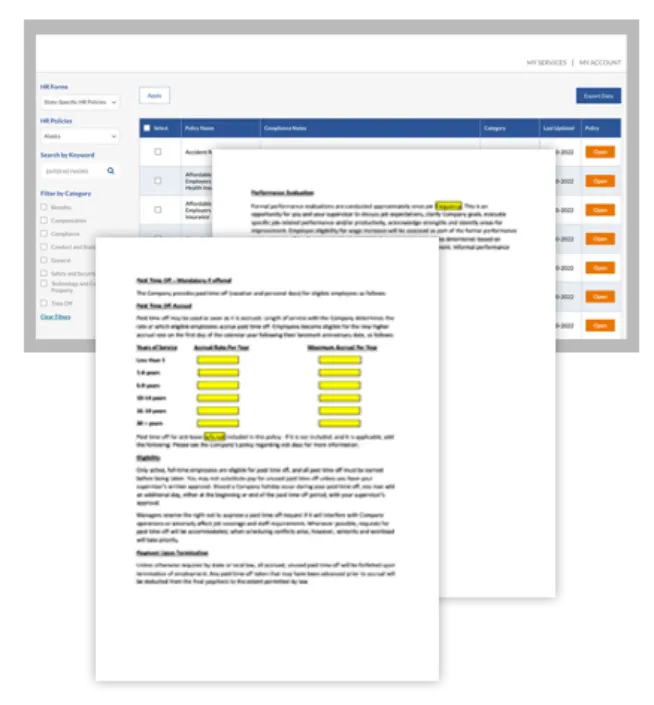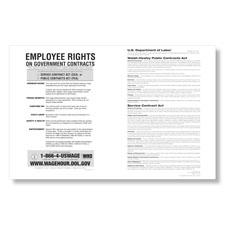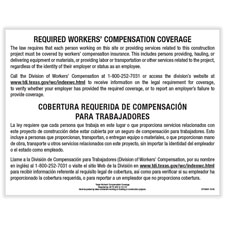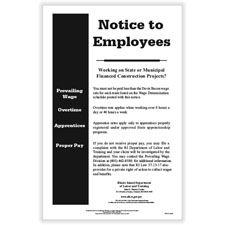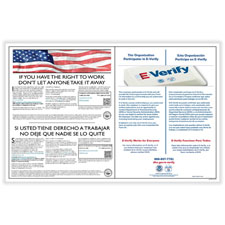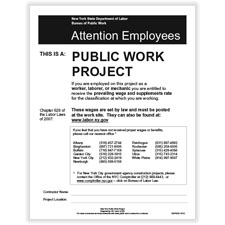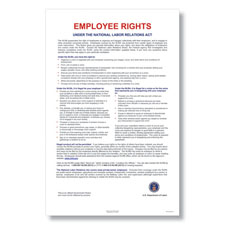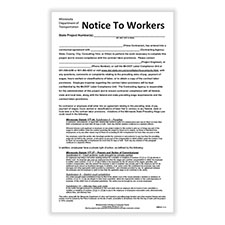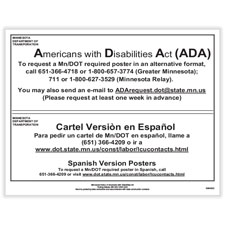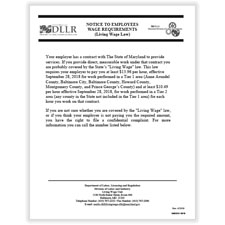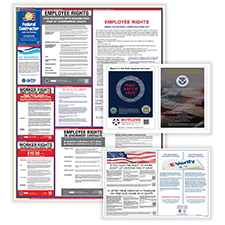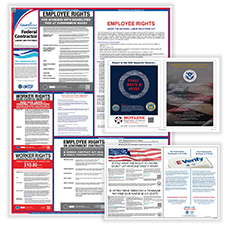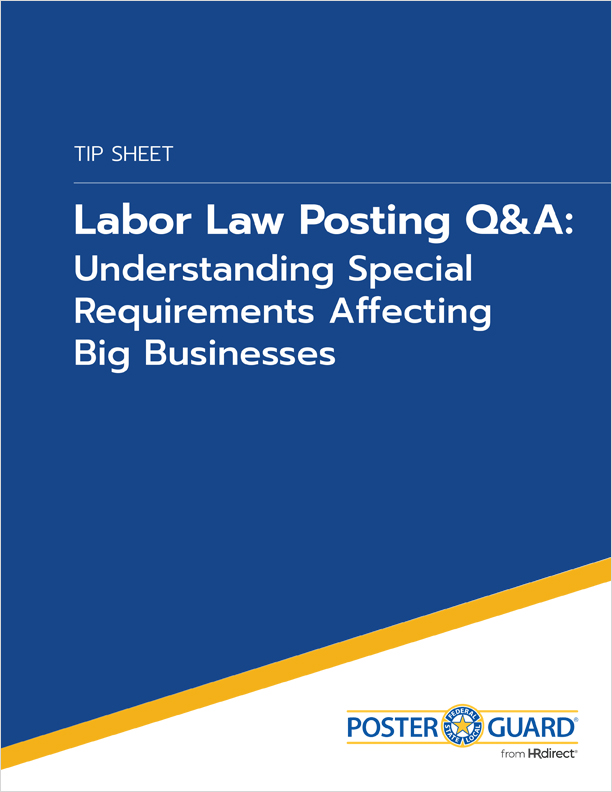Federal Contractor Labor Law Posters
Walsh-Healey Public/Service Contracts Poster
Display Walsh-Healey Public/Service Contracts Poster to Satisfy Employment Law Requirement
Depending on your relationship to the federal government and operational specifics, you may be required to display the Walsh-Healey Public/Service Contracts Poster. This poster notifies employees of the minimum wage, fringe benefits and overtime pay, as well as safety and health standards. (See below for more details.)
Available in English & Spanish.
English - E2201 • Spanish - E2201S
See Product Options tab below for guidance on language selection.
Texas Workers' Comp Coverage Poster/Notice to Workers on Construction Projects
Display Texas Workers' Comp Coverage Poster/Notice to Workers on Construction Projects to Communicate Legal Rights
The Texas Workers' Comp Coverage Poster/Notice to Workers on Construction Projects must be posted by all state contractors with state-building or construction contracts.
Texas law requires state contractors with state-building or construction contracts to display a special notice informing workers of their rights. The notice must be prominently displayed in areas easily accessible to all works, and it must be posted in both English and Spanish.
Rhode Island Notice to Employees State Contracts Poster
Inform Workers of Their Rights with the Rhode Island Notice to Employees State Contracts Poster
The Rhode Island Notice to Employees State Contracts Poster notice must be prominently displayed by all state contractors and subcontractors with state public works contracts.
Under state law, the Rhode Island Notice to Employees State Contracts Poster must be displayed by state contractors and subcontractors in areas accessible to all workers. This applies to contractors and subcontractors who perform any public work consisting of grading, cleaning, demolishing, improvement, completion, repair, alteration or construction of any public road or any bridge or portion thereof or any heavy construction or any public works projects.
Poster Guard® Right to Work/E-Verify Posting Service
Year-Round Posting Compliance Protection for E-Verify Participants
If you participate in the federal government's E-Verify program to confirm employee work eligibility, you must display the E-Verify and Right to Work posters (in English and Spanish) where all employees can view them.
The Poster Guard® Right to Work/E-Verify Posting Service provides one year of legal research, monitoring and automatic shipping of replacement posters whenever a mandatory change occurs. You will receive a brand new poster - no charge - when you sign up for this service.
New York Public Work Project Poster
Share Essential Worker Rights with the New York Public Work Project Poster
Under state law, the New York Public Work Project Poster must be clearly displayed by contractors and subcontractors with state public work construction contracts.
New York state law requires all contractors and subcontractors to post a notice that includes the telephone number and address for the Department of Labor (DOL) – as well as a statement informing laborers, workers or mechanics of their right to contact the DOL if they are not receiving the proper wages and/or supplements for the particular job classification. The notice must be displayed at the start of every public work contract on each job site.
National Labor Relations Act Poster
Display the National Labor Relations Act Poster to Uphold Regulatory Requirements
Under the National Labor Relations Act (NLRA), most federal contractors and subcontractors must inform employees of certain rights. The National Labor Relations Act Poster summarizes those rights, including the authority to organize and bargain collectively with employers and to engage in other protected activity. It also provides contact information for the National Labor Relations Board (NLRB), the agency that enforces the NLRA.
Available in English & Spanish.
English - E2208 • Spanish - E2212
See Product Options tab below for guidance on language selection.
Minnesota Notice to Workers on Construction Projects Poster
Satisfy Legal Requirements with the Minnesota Notice to Workers on Construction Projects Poster
The Minnesota Notice to Workers on Construction Projects Poster must be posted by state contractors and subcontractors with state construction contracts that involve the erection, construction, remodeling or repairing of a public building or other public work. The notice is required whether the project is financed in whole or in part by state funds.
Minnesota Notice of Nondiscrimination in Employment Poster
Satisfy State Contractor Posting Regulations with Minnesota Nondiscrimination in Employment Poster
Minnesota employers with state construction contracts must display this poster to inform employees of their right to be free from discrimination.
Minnesota Notice of Americans with Disabilities Act Poster
Meet Posting Requirements with the Minnesota Notice of Americans with Disabilities Act Poster
The Minnesota Notice of Americans with Disabilities Act Poster must be posted by state contractors and subcontractors with state construction contracts that involve the erection, construction, remodeling, or repairing of a public building or other public work. The notice is required whether the project is financed in whole or part by state funds.
Maryland Living Wage Law Poster
Display the Maryland Living Wage Law Poster to Communicate Important Legal Information
Maryland law requires that the Living Wage Poster be displayed by covered contractors and subcontractors working on state-funded service contracts.
Under Maryland law, it is mandatory for covered contractors and subcontractors working on state-funded service contracts to display the Living Wage Poster in areas where employees routinely gather. The poster details Maryland’s Living Wage Law which requires certain contractors and subcontractors working on state-funded service contracts to pay their employees an hourly rate that meets or exceeds the living wage rate established by the Commissioner of Labor.
Federal Contractor Poster Guard® Add-On Posters & Service
Year-Round Posting Compliance Protection for Federal Contractors
If your company does business with the federal government, you must display up to 10 employee notices (12 in the construction industry) — in addition to the usual postings required for all employers. The requirements can change any time by Executive Order. Failing to display these postings can result in suspension or cancellation of your contract.
Poster Guard® Poster Compliance Service for Federal Contractors satisfies all current posting requirements for companies that do business with the federal government. You'll receive a complete poster set right away, plus a full year of automatic replacements at no additional charge whenever a mandatory change occurs.
Federal Contractor Poster Bundle
All-Inclusive Mandatory Federal Contractor Labor Posters Bundle
The Federal Contractor Poster Bundle by ComplyRight consolidates each labor law poster requirement into one, easy solution. The bundle includes the commonly required postings to help protect contractors from steep fines and penalties, including suspension or cancellation of government contracts. (See below for more details.)
Available in English, Spanish and Bilingual.
See Product Options tab below for guidance on language and industry selection.
- 1
- 2
Businesses that contract with the federal government to provide goods or services may be responsible for displaying up to 13 additional federal contractor labor law posters beyond the mandatory federal and state postings. The specific obligations depend on the government agency, the type of contact and, in some cases, the dollar amount of the contract. Employers that don’t comply with the applicable federal contract law posting rules could face steep fines and lose government funding. Contracts can be suspended or cancelled due to noncompliance.

